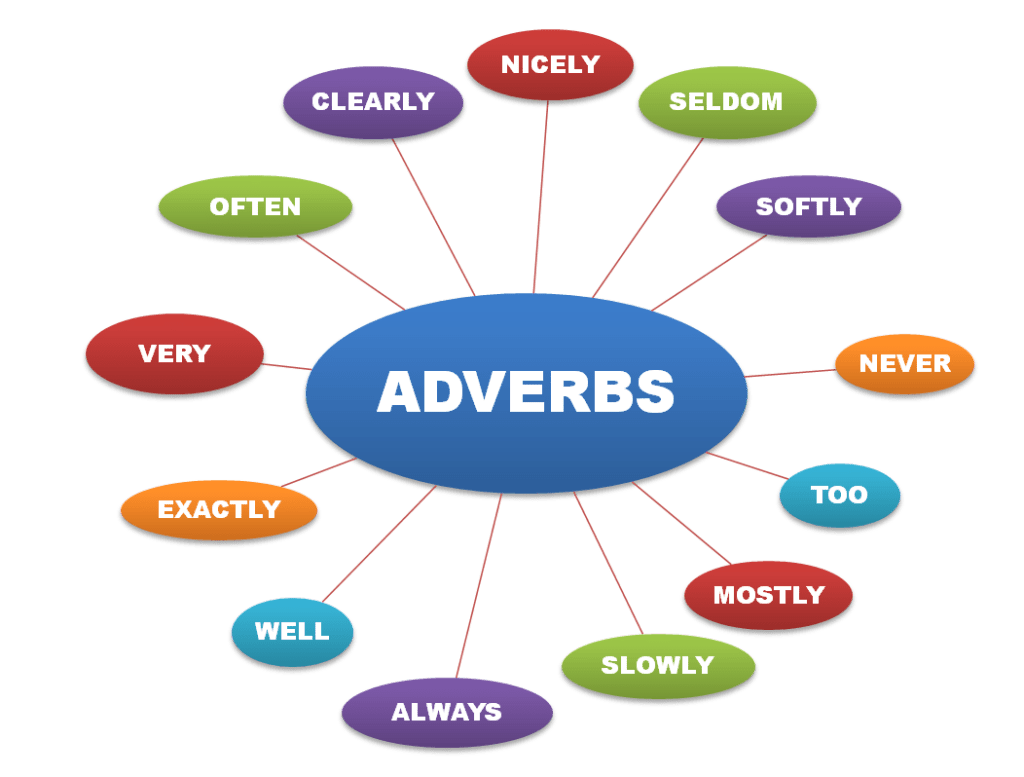This post includes adverb in Hindi and list of adverbs. The meaning of Adverb in hindi is as follows:
क्रिया विशेषण वह शब्द है जो क्रिया, विशेषण या अन्य क्रिया विशेषण का अर्थ जोड़ता है।
kriya visheshan vah shabd hai jo kriya, visheshan ya any kriya visheshan ka arth jodata hai.
Let’s have a look at the detailed post about Adverbs in Hindi and List of Adverbs:

What is an Adverb?
An adverb is a word that adds to the meaning of a verb, adjective, or another adverb.
Examples:
Very, extremely, well, really, quite, etc.
He runs fast. (Fast is an adverb adding to the meaning of the verb “Runs”)
He runs very fast. (Very is an adverb adding to the meaning of the adverb
“fast”)
He is fast. (Fast is an adjective)
He is very fast. (Very is an adverb adding to the meaning of the adjective
“fast”)
Some Examples of Adverbs

Types of Adverbs

Not all adverbs are one-word:
In the examples discussed previously, every adverb is a single word, but an adverb can be made up of more than one word.
For example:
How: He ran at 10 miles per hour.
(The underlined text is an adverbial phrase.)
When: He ran when the police arrived
(The underlined text is an adverbial clause.)
Where: He ran to the shops.
(adverbial phrase)
Why: He ran to fetch some water.
This is an adverbial phrase.
How often: He ran every day.
(adverbial phrase)
How much: He ran quicker than me.
(adverbial phrase)
How are Adverbs Formed?
Many adverbs end in -ly. More precisely, they are formed by adding -ly to an adjective:
Adjective slow quick soft sudden gradual
Adverb slowly quickly softly suddenly gradually
Because of their distinctive endings, these adverbs are known as -LY ADVERBS. However, by no means do all adverbs end in -ly. Note also that some adjectives also end in -ly, including costly, deadly, friendly, kindly, likely, lively, manly, and timely.
Degrees of Adverbs
Like adjectives, many adverbs also have degrees of comparison, and we can modify them using very or extremely:
softly very softly
suddenly very suddenly
slowly extremely slowly
The modifying words very and extremely are themselves adverbs. They are called DEGREE ADVERBS because they specify the degree to which an adjective or another adverb applies. Degree adverbs include almost, barely, entirely, highly, quite, slightly, totally, and utterly. Degree adverbs don’t have degrees of comparison. (*extremely very).
Like adjectives, too, some adverbs can take COMPARATIVE and SUPERLATIVE forms, with -er and -est:
Ali works hard — Sara works harder — I work the hardest
However, the majority of adverbs do not take these endings. Instead, they form the comparative using more and the superlative using most:
Adverb Comparative Superlative
Recently More recently Most recently
Effectively More Effectively Most Effectively
Frequently More frequently Most frequently
Irregular Adverbs
In the formation of comparatives and superlatives, some adverbs are irregular:
Adverb Comparative Superlative
well better best
badly worse worst
little less least
much more most
FINAL WORDS
This article discusses adverbs in detail. There are many other types of adverbs too according to different grammars.


